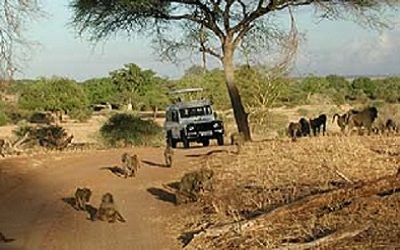
| Safari, in Kiswahili, simply means "journey". But in English it has become a synonyme for a
wildlife viewing adventure in the African bush. 'To go on safari' In Tanzania is, and always will remain a fascinating and exclusive experience!
It is well known that Tanzania has beautiful nature reserves rich in wildlife. There are, however, still many false ideas about this big southern neighbour of Kenya. It is true that Tanzania, measured in terms of pro-capita income, is one of the world's poorest countries. It is a fact
that the country can feed itself and, what is of greater significance, is that since independence Tanzania politically has been among the most
stable African countries. In regard to safety, both for its own citizens and for tourists, it is well ahead of its more economically advanced
neighbours.
In the past, tourism was of little significance to Tanzania and few people chose to visit it. To have to deal with all the uncertainties, and at
the same time not really be sure what natural attractions the country had to offer made one question whether the cost was reasonable. In fact this
did not have a negative effect upon the nature reserves and even during the most difficult times major efforts were undertaken to maintain the national
parks and also to create new ones.
Today, several sections of the tourism infrastructure have developed well and a couple of new hotels and luxury, charming camps conforming to
'international' standards have opened. There is reason to hope that the difference between the local way of life and the standards of rich inter
national tourists, which in many other third world countries has had such a negative impact, will be kept within reasonable limits.
|







